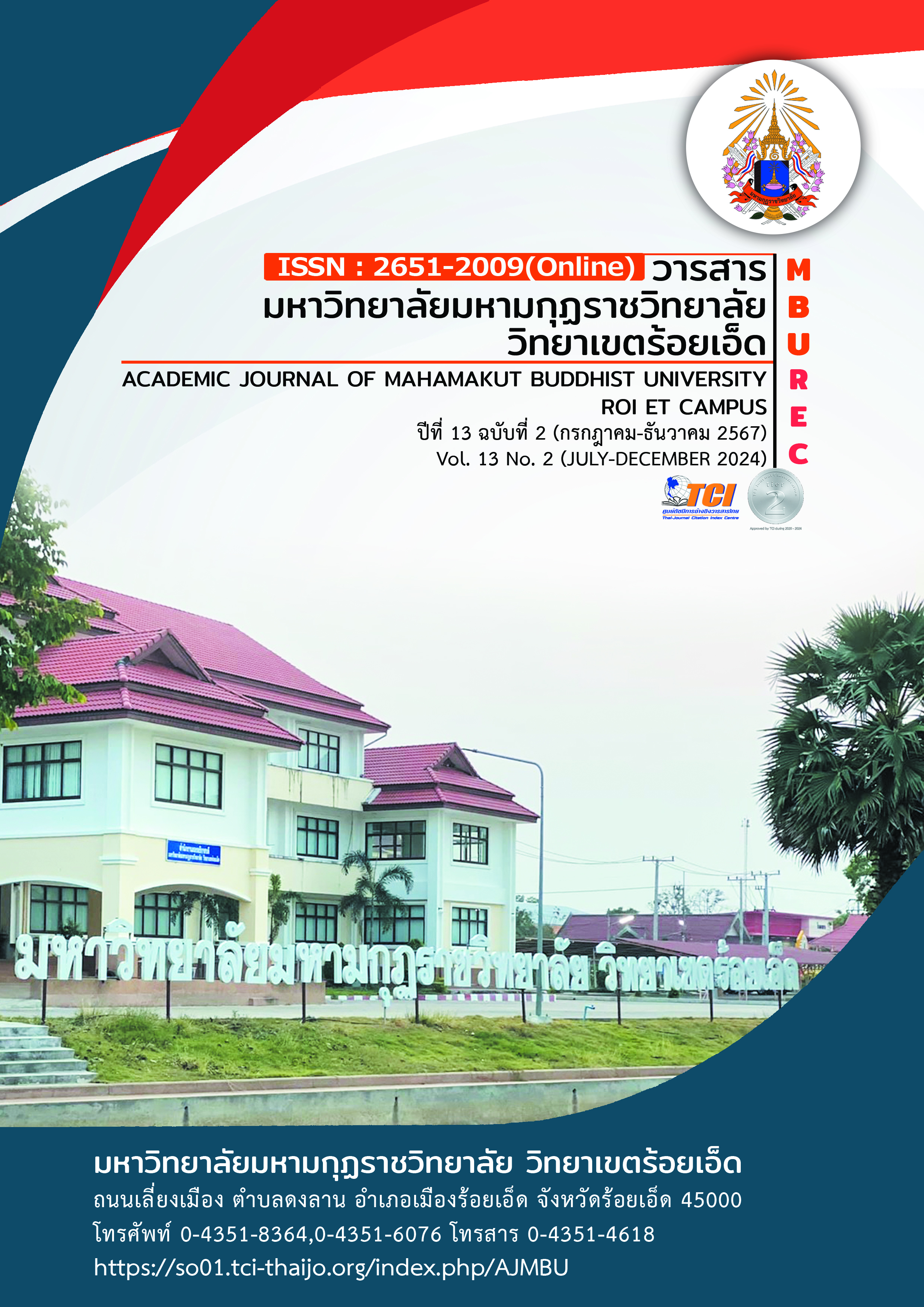AN APPLICATION OF THE PRINCIP OF THE FOUR VIRTUES CONDUCTIVE TO THE BENEFITS IN THE PRESENT FOR DEVELOPING THE AGRICULTURISTS’ QUALITY OF LIFT IN PARA RUBER PARK IN BUENGKAN PROVINCE
Main Article Content
Abstract
The purposes of this research aim at (1) studying the principles of the Four Virtues conductive to the benefits in the present in Buddhism (2) studying the state of developing the agriculturists’ quality of life in Para rubber park in Buengkan Province (3) offering the application of the principles of the Four Virtues Conductive to the Benefits in the Present for developing the agriculturists’ life in Para rubber park in Buengkan Province. This research is qualitative research. The research instrument was an interview form. Data analysis was performed using descriptive analysis.
The results of research are found that: 1. The principles of the Four Virtues conductive to the Benefits in the Presnet in Buddhism are the Four Benefits in the present, sometimes. it is ca;;ed as the heart of millionaires, “U, A, KA SA”, that is, 1) Utthanasampada: to be endowed with energy such as to be diligent to work, not to be lazy in that work 2) Arakkhasampada: to be endowed with the wealth protection and to know how to spend the wealth with carefulness 3) Kalayanmitta: to associate with good company, not to associate with bad persons and to associate with persons who comply with faith, charity, intelligence and 4) Samajivita: to live economically and to know the way of progressiveness and ruin of wealth. 2. The state of developing the agriculturists’ quality of life in Para rubber park in Buengkan Province is found that majority of people who are the agriculturists performing Para Rubber park has good quality of life because there are the factories transforming Para rubber locating in various areas of Buengkan Province in order to buy Para resin to be processed for exports. These Para resin products can be sold in the high price. 3. The application of the principle of the Four Virtues conductive to the benefits in the present for developing the agriculturists’ quality of life in Para rubber park in Buengkan Province is found that 1) in the aspect of Utthanasampada, people earn living with diligence and to be endowed with orderly model in upholding the life with regulation and to have wisdom associated with diligence until it creates expert in that work and they will accomplish easily without seriousness 2) in the aspect of Arakkhasampada, majority of local people know how to protect the received properties by knowing the virtue of them, learn the new issues passing the media on line in order to integrate various things to increase the value and income 3) in the aspect of Kalayamitta: majority of people understands how to associate with good persons not to associate with bad persons. To uphold oneself, discussion, conversation with persons in family or in village with friendly language, pure respectfulness, faith, precepts, charity and wisdom and 4) Samajivita: to earn living with sufficiency, to know the progressive way of property and ruin of wealth.
Article Details

This work is licensed under a Creative Commons Attribution-NonCommercial-NoDerivatives 4.0 International License.
References
กิตติ กรวัชรกิจ. (2565). การประยุกต์หลักอิทธิบาท 4 เพื่อการจัดการในการพัฒนาวิสาหกิจชุมชน. วิทยานิพนธ์พุทธศาสตรมหาบัณฑิต สาขาวิชาพระพุทธศาสนา. บัณฑิตวิทยาลัย : มหาวิทยาลัยมหาจุฬาลงกรณราชวิทยาลัย.
ณัฐพล ธาระวงศ์. (2559). การศึกษาแนวทางการประยุกต์ใช้หลักทิฏฐธัมมิกัตถประโยชน์เพื่อการทำงานที่มีประสิทธิภาพของบุคลากรหน่วยงานของรัฐในเขตอำเภอเมือง จังหวัดอุบลราชธานี. วิทยานิพนธ์พุทธศาสตรมหาบัณฑิต. บัณฑิตวิทยาลัย : มหาวิทยาลัยมหาจุฬาลงกรณราชวิทยาลัย.
พระพรหมคุณาภรณ์ (ป.อ. ปยุตฺโต). (2550). รุ่งอรุณของการศึกษา เบิกฟ้าแห่งการพัฒนาที่ยั่งยืน. กรุงเทพมหานคร : บริษัท พิมพ์สวย จำกัด.
พระไพรัช พุทฺธิสาโร (โพธิ์ประพาฬทอง). (2565). แนวทางการประยุกต์หลักพุทธธรรมเพื่ออนุรักษ์ และพัฒนาระบบนิเวศตามแนวพระไตรปิฎก. ดุษฎีนิพนธ์พุทธศาสตรดุษฎีบัณฑิต สาขาวิชาพระพุทธศาสนา. บัณฑิตวิทยาลัย : มหาวิทยาลัยมหาจุฬาลงกรณราชวิทยาลัย.
สำนักงานเกษตรและสหกรณ์จังหวัดบึงกาฬ. (2565). แผนพัฒนาการเกษตรและสหกรณ์ของจังหวัดบึงกาฬ พ.ศ. 2566 – 2570. บึงกาฬ : สำนักงานเกษตรและสหกรณ์จังหวัดบึงกาฬ.
สำนักงานคณะกรรมการพัฒนาเศรษฐกิจและสังคมแห่งชาติ. (2555). (ร่าง) แผนพัฒนาเศรษฐกิจและสังคมแห่งชาติ ฉบับที่ 10 (พ.ศ. 2555-2560). กรุงเทพมหานคร : สำนักงานคณะกรรมการพัฒนาเศรษฐกิจและสังคมแห่งชาติ.


